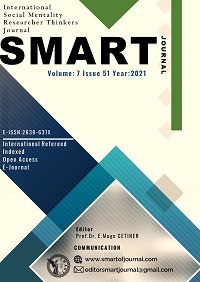Author :
Abstract
Endüstri haline gelen spor dünyasının en önemli branşlarından biri olan futbol, günümüzde en yüksek ücretlerin konuşulduğu spor dalıdır. Buradan hareket ile futbolun finansal boyutunun gün geçtikçe önemi artmaktadır. Bu çalışmanın amacı Türk futbol takımlarının finansal fair play penceresinden değerlendirmek ve bu doğrultuda finansal fair play kavramının futbol takımlarına olan etkilerini saptamaktır. Çalışmanın sonuçlarının gelecek çalışmalara temel oluşturması hedeflenmiş ve araştırma yöntemleri arasından derleme yöntemi seçilerek teorik çözümleme tekniği kullanılmıştır. Çözümleme tekniğine destek vermesi adına çeşitli platformlarda yayınlanan ulusal ve uluslararası bilimsel çalışmalar ile kulüplerin resmi kaynaklarından yararlanılmıştır. Finansal fair play Avrupa futbolunun mevcut ekonomik durumunun düzeltilmesi ve borçlardan uzak bir biçimde iyileştirilmesi amacı ile 2010 yılında UEFA tarafından kabul edilen bir kuraldır. Bu doğrultuda finansal fair play günümüzde tüm dünyada tanınan ve önem verilen bir kural olması sebebi ile çalışmamızın genel çerçevesini oluşturmaktadır. Çalışmada incelenen literatür sonuçları gösteriyor ki Türk futbol takımları finansal fair play kuralı kabul edildikten sonra ekonomik özgürlükleri kısıtlanmış ve alışılagelmiş olan borçlar ile transfer dönemleri yerini planlı, sistemli ve borçlardan uzak bir ekonomik düzen yönetimine bırakırken bu düzenlemeye uyum sağlayamayan süper lig kulüpleri UEFA tarafından men cezaları ve idari para cezalarına maruz bırakılmıştır.
Keywords
Abstract
Football, one of the most important branches of the sports world, which has become an industry, is the sports branch where the highest wages are spoken today. From this point of view, the importance of the financial dimension of football is increasing day by day. The aim of this study is to evaluate Turkish football teams from the perspective of financial fair play and to determine the effects of the concept of financial fair play on football teams in this direction. The results of the study were aimed to form a basis for future studies and the theoretical analysis technique was used by choosing the compilation method among the research methods. In order to support the analysis technique, national and international scientific studies published on various platforms and official sources of clubs were used. Financial fair play is a rule adopted by UEFA in 2010 with the aim of improving the current economic situation of European football and improving it away from debts. In this direction, the concept of Financial Fair Play constitutes the general framework of our work, since financial fair play is a rule that is recognized and given importance all over the world today. The results of the literature examined in the study show that after the adoption of the financial fair play rule, Turkish football teams' economic freedoms were restricted and the usual debts and transfer periods were replaced by a planned, systematic and debt-free economic order management, while the super league clubs that could not comply with this regulation were banned and banned by UEFA. subjected to administrative fines.
Keywords
- Akalın A. (2018) Galatasaray, Fenerbahçe, Beşiktaş Spor Kulüpleri ile Manchester United Spor Kulübünün
- Akalın A. (2018) Galatasaray, Fenerbahçe, Beşiktaş Spor Kulüpleri ile Manchester United Spor KulübününFinansal Raporlarının Analizi ve Finansal Fair Play Açısından Değerlendirilmesi (Yayımlanmış Yüksek Lisans Tezi), Atılım Üniversitesi Sosyal Bilimler Enstitüsü, Ankara.
- Donuk B. (2019), Tam Yol Yönetim, Ötüken Neşriyat,İstanbul
- Kale, N. ve Dumangöz, P.D. (2021). Spor ve Felsefe. Ankara: Nobel Yayınevi
- Lang, M. (2013), Economic effects of UEFA’s Financial Fair Play regulations, Final report to UEFA.
- Renson R. (2009), Fair play: Spor ve toplumdaki kökenleri ve anlamları. Kinesiyoloji Dergisi, 41(1):5-18
- Şaban M. ve Demirci F. (2016), Finansal Fair Play ve Türkiye'deki Dört Büyük Futbol Kulübünün Uyum Düzeyinin İncelenmesi, Mali Çözüm, 25-49
- https://www.tff.org/default.aspx?pageID=293 Erişim Tarihi: 06.09.2021
- https://www.aktifbank.com.tr/tr/Documents/FUTBOL-EKONOMISI-RAPORU%20.pdf 07.09.2021, Saat: 14:45
- https://tavakvakfi.org/wp-content/uploads/2019/02/FFFutbol2018-converted.pdf,Erişim Tarihi: 06.09.2021 http://www.fairplayinternational.org/what-is-fair-play- Erişim Tarihi: 06.09.2021
- https://www.uefa.com/insideuefa/protecting-the-game/financial-fair-play/ ErişimTarihi:06.08.2021





